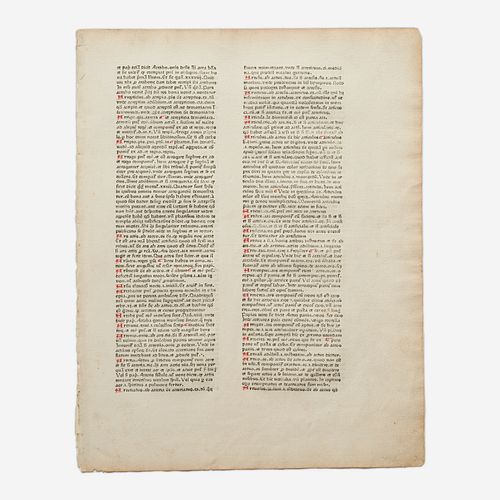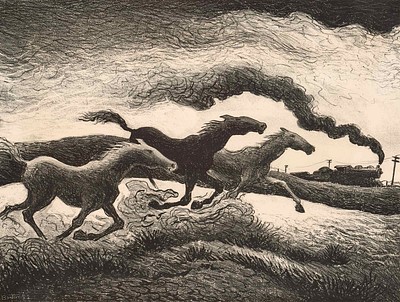1469 Catholicon Printed Incunable Leaf (Gutenberg attr.)
Two ways to bid:
- Leave a max absentee bid and the platform will bid on your behalf up to your maximum bid during the live auction.
- Bid live during the auction and your bids will be submitted real-time to the auctioneer.
Bid Increments
| Price | Bid Increment |
|---|---|
| $0 | $25 |
| $500 | $50 |
| $1,000 | $100 |
| $5,000 | $250 |
| $10,000 | $500 |
| $20,000 | $1,000 |
| $50,000 | $2,500 |
| $75,000 | $5,000 |
| $100,000 | $10,000 |
About Auction
Oct 28, 2023
Circle Auction invites you to investigate our latest collection of fine art, antiques, jewelry, and collectibles. Among our autumn fine art offerings are pieces by Birger Sandzen, Thomas Hart Benton, Antoine Blanchard, William Franklin Jackson, Robert Sudlow, and more. Circle Auction info@circle-auction.com
- Lot Description
An early printed leaf of the Catholicon of Johannes Balbus of Genoa. Mainz, first printed in 1460, this from the second impression in 1469. Galliziani folio with Gothic type in Latin, 66 lines in two columns. This leaf containing dictionary entries from "Arrepticius" to "Asintheton." 14 1/4" x 11 1/4", and housed in a mat that measures 18 1/2" x 14 1/2".
Originally written in 1286, Balbus's Catholicon was a significant encyclopedic text, and following Gutenberg's invention of the printing press, it would become the first work of secular learning ever printed. The first edition of the Catholicon was printed in three impressions, dated 1460, 1469, and 1472. Printed on Galliziani paper, this leaf is from the second impression, the rarest of the three.
There is debate about the printer of the Catholicon: at one point presumed to be Johannes Gutenberg, the identity of the printer is now viewed as less than conclusive. The most recent leading theory, espoused by incunabula scholar Paul Needham is that the Catholicon was printed from 2-line slugs (stereotype) by Gutenberg, a process previously thought to have been developed a few decades later. If that is the case, not only would Catholicon be Gutenberg's final printed work, but it would also represent another significant technological leap forward as the first example of stereotype. According to this theory, the second impression in 1469 was printed by Peter Schoeffer and Konrad Humery from Gutenberg's original slugs.
Provenance: A private collection, acquired from H.P. Kraus Rare Books and Manuscripts (New York).
Dimension
Height: 18.50 inWidth: 14.50 inDepth: 0.25 inDepth: 0.25 inCondition
The leaf is archivally hinged at the left edge to the backing mat. Good condition, with very slight chips to the edges and top right corner. Mild browning to the edges.
- Shipping Info
-
Pick Up, Packing, & Shipping:
Winning bidders may pick up their lots, once paid in full, at Circle’s auction office during regular business hours. If packing and shipping is required, we can provide you with a list of recommended shippers by request. You will be responsible to contact, arrange shipment, and pay 3rd party shippers. Circle will not be responsible for loss or damage of purchased lots handled or shipped, nor for acts and omissions, by 3rd party shippers, whether recommended by us or not. Circle will not release the lot for shipment until payment has been made in full and a buyer’s written shipping authorization form has been received. Winning bids may not be retracted, canceled or rescinded due to issues with shipping including, but not limited to, costs or prohibitions. It is the responsibility of the bidder to account for shipping prior to bidding.
Failure to Pick Up & Storage:
Winning bidders must pick up or have lots shipped within 15 calendar days of the close of the auction. On the 16th day from the close of the auction Circle has the right to charge the winning bidder a storage fee of $5 per lot per day. Lots that have been paid for, but remain on our premises sixty (60) days from the close of the auction may be sold by Circle, with no notice to the buyer. Any funds in excess of the purchase price, commissions, applicable costs, and storage fees will be remitted to the original winning bidder. At the point where storage fees associated with an unshipped item exceed the hammer price of the item the winning bidder will be considered in default of our terms and conditions and forfeits ownership to Circle Auction or its affiliated companies. In the case where the item is forfeited the winning bidder will not be compensated in any way. Lots left with Circle after the 16th day from the close of the auction are stored at the buyer’s risk. If you have any questions regarding these terms please contact Circle Auction by email at : Info@Circle-Auction.com
-
- Payment & Auction Policies
-
Available payment options
-
-
- Buyer's Premium



 EUR
EUR CAD
CAD AUD
AUD GBP
GBP MXN
MXN HKD
HKD CNY
CNY MYR
MYR SEK
SEK SGD
SGD CHF
CHF THB
THB


























